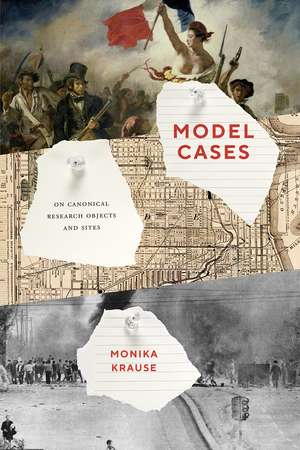Model Cases: On Canonical Research Objects and Sites
Autor Monika Krauseen Limba Engleză Paperback – 3 sep 2021
Some research objects are studied repeatedly and shape our understanding of more general ideas in disproportionate ways: The French Revolution has profoundly influenced our concepts of revolution, of citizenship, and of political modernity, just like studies of doctors have set the agenda for research on the professions. Based on an extensive analysis of the role of model cases in different fields, Krause argues that they can be useful for scholarly communities if they are acknowledged and reflected as particular objects; she also highlights the importance of research strategies based on neglected research objects and neglected combinations of research objects and scholarly concerns.
| Toate formatele și edițiile | Preț | Express |
|---|---|---|
| Paperback (1) | 222.81 lei 6-8 săpt. | |
| University of Chicago Press – 3 sep 2021 | 222.81 lei 6-8 săpt. | |
| Hardback (1) | 604.22 lei 6-8 săpt. | |
| University of Chicago Press – 3 sep 2021 | 604.22 lei 6-8 săpt. |
Preț: 222.81 lei
Nou
Puncte Express: 334
Preț estimativ în valută:
42.64€ • 45.59$ • 35.55£
42.64€ • 45.59$ • 35.55£
Carte tipărită la comandă
Livrare economică 18 aprilie-02 mai
Preluare comenzi: 021 569.72.76
Specificații
ISBN-13: 9780226780832
ISBN-10: 022678083X
Pagini: 224
Ilustrații: 8 tables
Dimensiuni: 152 x 229 x 23 mm
Greutate: 0.3 kg
Ediția:First Edition
Editura: University of Chicago Press
Colecția University of Chicago Press
ISBN-10: 022678083X
Pagini: 224
Ilustrații: 8 tables
Dimensiuni: 152 x 229 x 23 mm
Greutate: 0.3 kg
Ediția:First Edition
Editura: University of Chicago Press
Colecția University of Chicago Press
Notă biografică
Monika Krause is associate professor of sociology at the London School of Economics. She is the author of The Good Project: Humanitarian Relief NGOsandthe Fragmentation of Reason and coeditor of Social Theory Now, both also published by the University of Chicago Press.
Cuprins
Introduction
1. Material Research Objects and Privileged Material Research Objects
2. How Material Research Objects Are Selected
3. Model Cases and the Dream of Collective Methods
4. How Subfield Categories Shape Knowledge
5. The Schemas of Social Theory
6. The Model Cases of Global Knowledge
Conclusion
Acknowledgments
Notes
Bibliography
Index
1. Material Research Objects and Privileged Material Research Objects
2. How Material Research Objects Are Selected
3. Model Cases and the Dream of Collective Methods
4. How Subfield Categories Shape Knowledge
5. The Schemas of Social Theory
6. The Model Cases of Global Knowledge
Conclusion
Acknowledgments
Notes
Bibliography
Index
Recenzii
“Krause has written a powerful, illuminating argument about how the social sciences should work. It is a worthy successor to Max Weber's Science as a Vocation.”
“Model Cases is an ambitious and compelling contribution to our understanding of the practice of scholarship, whose inner logic Krause perceptively dissects across different disciplines and methodologies. Her account of how scholars relate to the objects they study offers foundational insights into how we argue and perform research within the humanities."
"If the book didn’t already have a subtitle, On Canonical Research Objects and Sites, Monika Krause could have titled it Model Cases: On the Metaphysics of the Syllabus. Her fascinating book is an examination–even a deconstructive analysis–of the two- or three-page document traditionally handed out in the first class on a university program but now usually posted on class management systems like Blackboard."
"What do we as scholars look at when we do research? That is the simple but effective question that underlies Monika Krause’s highly instructive new book, Model Cases... It is a book that makes us think about the collective research patterns that we are a part of."
"Model Cases would be excellent for a graduate seminar on the philosophy, theory, or methodology of a number of social science disciplines."
Descriere
We all know scientists study a predictable set of organisms when performing research, whether they be mice, fruit flies, or less commonly known but widely used species of snail or worm. But when we think of the so-called humanistic social sciences, we envision a different kind of research attuned to historical power relations or the unique experiences of a social group. In Model Cases, sociologist Monika Krause uncovers the ways the humanities and social sciences are shaped by and dependent on a set of canonical research objects of their own, often in unacknowledged ways.
Krause shows that some research objects are studied repeatedly and shape the understanding of more general categories in disproportionate ways. For instance, Chicago comes to be the touchstone for studies of the modern city, or Michel Foucault's analysis of Bentham's prison a guiding light for understanding contemporary power relations. Moving through classic cases in the social sciences, Krause reveals the ways canonical examples and sites have shaped research and theory, showing how they can both help and harm the production of knowledge. In the end, she argues, model cases have great potential to serve scholarship--as long as they are acknowledged and examined with acuity.
Krause shows that some research objects are studied repeatedly and shape the understanding of more general categories in disproportionate ways. For instance, Chicago comes to be the touchstone for studies of the modern city, or Michel Foucault's analysis of Bentham's prison a guiding light for understanding contemporary power relations. Moving through classic cases in the social sciences, Krause reveals the ways canonical examples and sites have shaped research and theory, showing how they can both help and harm the production of knowledge. In the end, she argues, model cases have great potential to serve scholarship--as long as they are acknowledged and examined with acuity.
